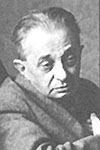The page of Lengyel József, English biography
Biography
[Hungarian] [English]
Born August 4, 1896, in Marcali. Novelist, short-story writer, poet. Descendant of middle-class family. Completed gymnasium studies in Budapest and studies in philosophy at Universities of Budapest and Vienna. His poems first appeared in A Tett in 1915, later in Ma. Formed connection with Ervin Szabó's anti-militaristic movement in early years of World War I. Was among first members of Communist party in Hungary. Helped to edit Vörös Újság and Ifjú Gárda. Arrested at end of February 1919. Carried on many newspaper and party activities. Emigrated to Vienna in August 1919, where he lived for months in barracks in Grinzing. Served on board of Írók Könyvtára series, which published writings of emigrant authors, including those of Lajos Kassák (q.v.) and Béla Balázs (q.v.). Moved to Berlin at beginning of 1927. Worked as journalist and articles appeared in Rote Fahne and Welt am Abend. Also dramaturge for Prometheus Film Studio and editor of Film und Volk. Emigrated to Moscow in 1930. Editorial staff member of Sarló és Kalapács. Arrested as supporter of Béla Kun in February 1938. Interrogated continually in prison for three years and exiled to Norilszk Region in Siberia at outbreak of World War II. Later freed from workcamp and exiled to Deleb, Siberia. Again freed in 1953. Rehabilitated in 1955 and returned to Hungary. Numerous works have been published since then. In recent years he has been a publicist in Hungarian literary life. Awarded Attila József Prize for Visegrádi utca and Kulcs in 1957, Central Council of Hungarian Trade Unions Prize for lifework and Visegrádi utca in 1958, and Kossuth Prize for Igéző in 1963.
His early writings were influenced by avantgardism through Kassák. Novels and short stories, more important than poems, express revolutionary themes and social reforms in realistic style. Especially concerned with workers' movement. Oldás és kötés, a short story, was produced as a film in 1962.
Hungarian Authors. A Bibliographical Handbook by Albert Tezla




